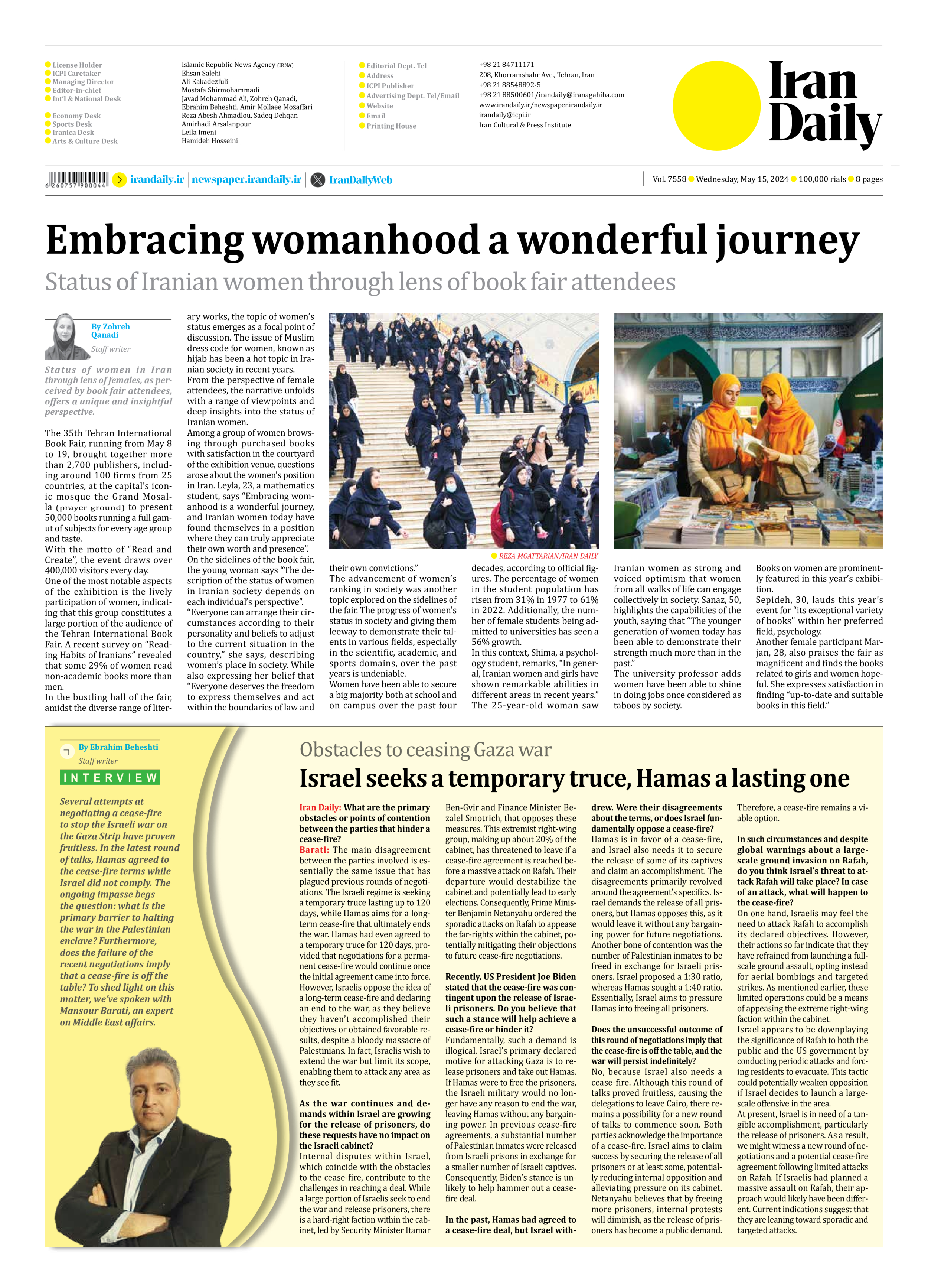
Obstacles to ceasing Gaza war
Israel seeks a temporary truce, Hamas a lasting one
Several attempts at negotiating a cease-fire to stop the Israeli war on the Gaza Strip have proven fruitless. In the latest round of talks, Hamas agreed to the cease-fire terms while Israel did not comply. The ongoing impasse begs the question: what is the primary barrier to halting the war in the Palestinian enclave? Furthermore, does the failure of the recent negotiations imply that a cease-fire is off the table? To shed light on this matter, we’ve spoken with Mansour Barati, an expert on Middle East affairs.
By Ebrahim Beheshti
Staff writer
Iran Daily: What are the primary obstacles or points of contention between the parties that hinder a cease-fire?
Barati: The main disagreement between the parties involved is essentially the same issue that has plagued previous rounds of negotiations. The Israeli regime is seeking a temporary truce lasting up to 120 days, while Hamas aims for a long-term cease-fire that ultimately ends the war. Hamas had even agreed to a temporary truce for 120 days, provided that negotiations for a permanent cease-fire would continue once the initial agreement came into force. However, Israelis oppose the idea of a long-term cease-fire and declaring an end to the war, as they believe they haven’t accomplished their objectives or obtained favorable results, despite a bloody massacre of Palestinians. In fact, Israelis wish to extend the war but limit its scope, enabling them to attack any area as they see fit.
As the war continues and demands within Israel are growing for the release of prisoners, do these requests have no impact on the Israeli cabinet?
Internal disputes within Israel, which coincide with the obstacles to the cease-fire, contribute to the challenges in reaching a deal. While a large portion of Israelis seek to end the war and release prisoners, there is a hard-right faction within the cabinet, led by Security Minister Itamar Ben-Gvir and Finance Minister Bezalel Smotrich, that opposes these measures. This extremist right-wing group, making up about 20% of the cabinet, has threatened to leave if a cease-fire agreement is reached before a massive attack on Rafah. Their departure would destabilize the cabinet and potentially lead to early elections. Consequently, Prime Minister Benjamin Netanyahu ordered the sporadic attacks on Rafah to appease the far-rights within the cabinet, potentially mitigating their objections to future cease-fire negotiations.
Recently, US President Joe Biden stated that the cease-fire was contingent upon the release of Israeli prisoners. Do you believe that such a stance will help achieve a cease-fire or hinder it?
Fundamentally, such a demand is illogical. Israel’s primary declared motive for attacking Gaza is to release prisoners and take out Hamas. If Hamas were to free the prisoners, the Israeli military would no longer have any reason to end the war, leaving Hamas without any bargaining power. In previous cease-fire agreements, a substantial number of Palestinian inmates were released from Israeli prisons in exchange for a smaller number of Israeli captives. Consequently, Biden’s stance is unlikely to help hammer out a cease-fire deal.
In the past, Hamas had agreed to a cease-fire deal, but Israel withdrew. Were their disagreements about the terms, or does Israel fundamentally oppose a cease-fire?
Hamas is in favor of a cease-fire, and Israel also needs it to secure the release of some of its captives and claim an accomplishment. The disagreements primarily revolved around the agreement’s specifics. Israel demands the release of all prisoners, but Hamas opposes this, as it would leave it without any bargaining power for future negotiations. Another bone of contention was the number of Palestinian inmates to be freed in exchange for Israeli prisoners. Israel proposed a 1:30 ratio, whereas Hamas sought a 1:40 ratio. Essentially, Israel aims to pressure Hamas into freeing all prisoners.
Does the unsuccessful outcome of this round of negotiations imply that the cease-fire is off the table, and the war will persist indefinitely?
No, because Israel also needs a cease-fire. Although this round of talks proved fruitless, causing the delegations to leave Cairo, there remains a possibility for a new round of talks to commence soon. Both parties acknowledge the importance of a cease-fire. Israel aims to claim success by securing the release of all prisoners or at least some, potentially reducing internal opposition and alleviating pressure on its cabinet. Netanyahu believes that by freeing more prisoners, internal protests will diminish, as the release of prisoners has become a public demand. Therefore, a cease-fire remains a viable option.
In such circumstances and despite global warnings about a large-scale ground invasion on Rafah, do you think Israel’s threat to attack Rafah will take place? In case of an attack, what will happen to the cease-fire?
On one hand, Israelis may feel the need to attack Rafah to accomplish its declared objectives. However, their actions so far indicate that they have refrained from launching a full-scale ground assault, opting instead for aerial bombings and targeted strikes. As mentioned earlier, these limited operations could be a means of appeasing the extreme right-wing faction within the cabinet.
Israel appears to be downplaying the significance of Rafah to both the public and the US government by conducting periodic attacks and forcing residents to evacuate. This tactic could potentially weaken opposition if Israel decides to launch a large-scale offensive in the area.
At present, Israel is in need of a tangible accomplishment, particularly the release of prisoners. As a result, we might witness a new round of negotiations and a potential cease-fire agreement following limited attacks on Rafah. If Israelis had planned a massive assault on Rafah, their approach would likely have been different. Current indications suggest that they are leaning toward sporadic and targeted attacks.







